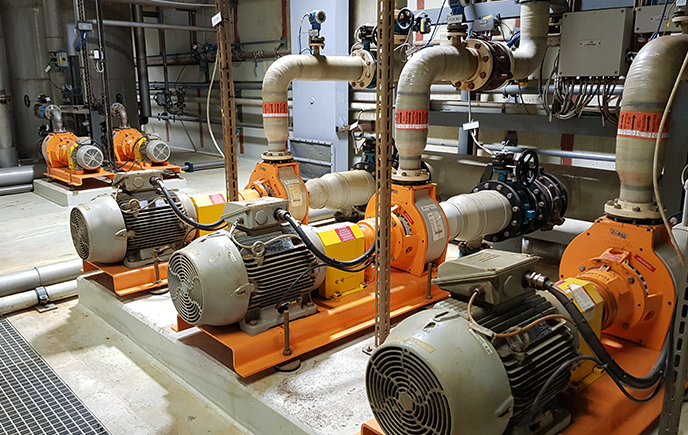Full steam ahead - Scottish distillery with Grundfos
There’s steam and there’s high-quality steam. There are pump solutions and intelligent pump solution...
Choosing the right chemicals pump is a matter of concentration. While everyone knows that sulphuric acid, for example, is exceptionally corrosive, its corrosiveness depends on its concentration and temperature. So which material to choose for a pump when sulphuric acid is the pumping medium is not as simple as it might seem.

If the sulphuric acid is being pumped for a particular process, you’d presume the concentration would be consistent. But the truth is very different. For example, simply cleaning the process equipment may leave some residue of other liquid, and when the acid starts to flow through the system again its concentration will be changed through contamination.
Suddenly, the material the pump is made from – selected to be resistant to a certain concentration range – will become unresistant, and the pump will start to corrode. Even worse, if the pump is metal and the surface corrodes, the corrosion will build-up until it is washed off or falls off. This leaves a fresh surface for the corrosion process to start all over again, and again, and again. Now corrosion turns to erosion, as the material – and the pump – are gradually eaten away.
Clearly, choosing the right material to cope with the correct range of concentrations at a given temperature is essential. And when an international chemical group made the wrong choice, they paid the price in more ways than one.
Titanium oxide (TiO2) is a pigment used to make products such as toothpaste look whiter and shinier. It’s manufactured by hydrolysing titanium oxide sulphate to produce TiO2 and H2SO4 (sulphuric acid).
For the chemical company producing the titanium oxide, it was the sulphuric acid
by-product which caused the problems with their process pumps.
The pumps are required to run continually at a temperature of 110°C, pumping sulphuric acid at 30% concentration. However, the Hastelloy nickel-based steel alloy pumps were failing frequently due to corrosion and erosion, and the cost of downtime was compounded by the high cost of replacement Hastelloy parts.
In their search for a solution they approached Munsch to assess the possibility of replacing the metal pumps with plastic.
As specialists in plastic pumps, Munsch offer their NP range in a choice of polypropylene (PP), polyethylene (PE) and polyvinylidene difluoride (PVDF).
Whereas most metals are only resistant to sulphuric acid corrosion across a narrow concentration band, Munsch plastic pumps are resistant from 0% to 98% concentration. Whilst PP and PE materials are chemically similar, PE provides better erosion protection, but with an upper operating temperature limit of 85-90°C. PVDF provides slightly less protection against erosion, but is suitable for the operating temperature of 110°C in this customer’s application. And since it eliminates corrosion, it also prevents erosion.
The customer installed the recommended NP pump in PVDF for a trial period, after which they added a number of identical units. All the pumps have now been running for several years with no signs of corrosion or erosion, and can be expected to run for as long as 20 years without failing.
The design philosophy behind Munsch pumps is all about simplicity.
Designed to be as easy as possible to assemble and disassemble, there is literally only one way to put a Munsch pump together. This means there’s no risk of a leak from a wrongly-assembled pump.
The non-metallic mechanical sealing system is also simplified for flexibility and cost-efficiency. A single mechanical seal can be operated in single, double, shutdown flush or continuous flush operating modes, and the same seal size will fit all Munsch pumps. Again, this eliminates the risk of error in assembly, as well as reducing inventory costs and simplifying repair and maintenance.
By concentrating on manufacturing simply the best plastic pumps, Munsch leave their customers free to concentrate on their processes, without fear of pump failure.
Get the latest updates from ERIKS including:
Choose any or all of these via the ERIKS Subscription Centre!
Our Know+How brings together the best of the latest Know+How Hub articles in one easy to digest magazine, covering the following topics:
That's why its the leading magazine for maintenance engineers from ERIKS.
Want Know+How Magazine delivered direct to your door? Visit the ERIKS Subscription Centre to opt-in!
Take a look at our latest updates...
There’s steam and there’s high-quality steam. There are pump solutions and intelligent pump solution...
Looking for a custom Product quote? Need an answer to a Technical question? Looking for Careers/HR support? Want to work with us? Interested in our Digital Trading solutions? Have a finance question? Send us your enquiry and a member of the ERIKS team will be with you quickly.
We strive to deliver exceptional quality service and products. As part of this goal, we encourage customers to submit feedback on their experiences so we can resolve any issues and concerns.
At ERIKS we strive to deliver the best quality service and products. As part of this goal we encourage customers to submit feedback on their experiences so we can resolve any issues and concerns.
Call us: +441215086000
